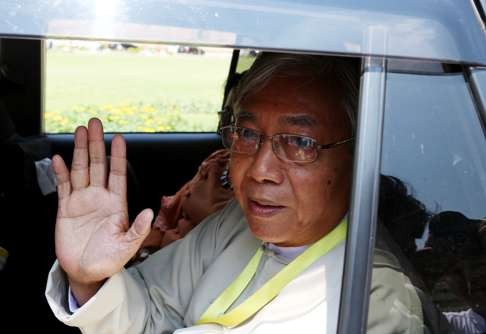
Who is Htin Kyaw, Myanmar’s new president?
A childhood friend of Nobel Peace Prize winner Aung San Suu Kyi was elected on Tuesday as Myanmar’s new president, a major step for a country ruled or partially ruled by the military for more than half a century.
Htin Kyaw, 69, the first civilian to hold the presidency, was selected by lawmakers in Myanmar’s capital, Naypyitaw, following parliamentary elections in November in which Suu Kyi’s pro-democracy opposition party won by a landslide.
READ MORE: Suu Kyi’s close aide picked in historic vote for Myanmar’s next president
“This is a victory for the people of this country,” Htin Kyaw told reporters in brief remarks.
Htin Kyaw is expected to take direction from Suu Kyi, who said before the November election that she would hold a position “above the president” if her National League of Democracy party won a majority. The former military junta barred Suu Kyi, a former political prisoner, from ascending to the country’s highest office by instituting a law disqualifying anyone with foreign family members. Suu Kyi’s late husband was British.
“He will be a most obedient servant for Aung San Suu Kyi,” Robert San Aung, a human rights lawyer, said by phone from Yangon.
Htin Kyaw, a member of the NLD executive committee, was hardly a household name in Myanmar, and even after his selection, news outlets were struggling to confirm pieces of his biography.

A resume posted on Facebook by a party official said Htin Kyaw earned a master’s degree in economics from Yangon University before working in economic affairs for the Foreign Ministry in the 1980s. The party did not confirm whether the biography was official.
He has won praise for being a loyal member of Suu Kyi’s party, which has led the struggle for democratic rule for decades. He is a director at a charitable foundation and remained close to Suu Kyi when she was placed under house arrest by the generals, even being jailed himself when he once attempted to accompany her on a trip to the city of Mandalay.
Historian Thant Myint-U called him “a very nice man” of “unimpeachable integrity”.
Under Myanmar’s system, the president is chosen by the parliament, which reserves one-quarter of the seats for the military. Htin Kyaw (pronounced “Chaw”) was nominated by Suu Kyi’s party and won 360 out of 652 votes cast by lawmakers.

A candidate chosen by the military bloc, Myint Swe, won the second most votes and will become the first vice-president. Myint Swe remains on a US government blacklist due to his ties to former junta leader Than Shwe, a sign of the continued challenges to US efforts to re-engage with Myanmar.
It’s unclear whether Suu Kyi would hold any position in the new government. Analysts say she is likely to serve as a kind of puppet master, determining the party’s political agenda, including rapprochement with the outside world and jump-starting a long isolated economy.
Many of Myanmar’s 53 million people are expecting significant changes, but under military rule public institutions ceased to function effectively. Suu Kyi has issued only vague policy ideas and analysts say it’s unclear whether her party can make the transition from pro-democracy activism to competent governance.
“Odds are that the NLD’s economic goals will not be met” because Myanmar’s state institutions “are not up to the job”, Lex Rieffel, a senior fellow at the Brookings Institution in Washington, wrote in a commentary.
READ MORE: Despite Myanmar dam blockage, China confident about ties with Suu Kyi government
The government will also have to contend with pressure from China, which grew close to the military government and has also courted Suu Kyi. In recent weeks, Chinese officials have signalled that they will try to restart construction on the Myitsone Dam, a mammoth hydropower project on Myanmar’s Irrawady River that was suspended five years ago due to intense domestic opposition.
Suu Kyi has not taken a public stance on the proposed 3,000-megawatt dam, which would export nearly all of its electricity into China’s Yunnan province.

